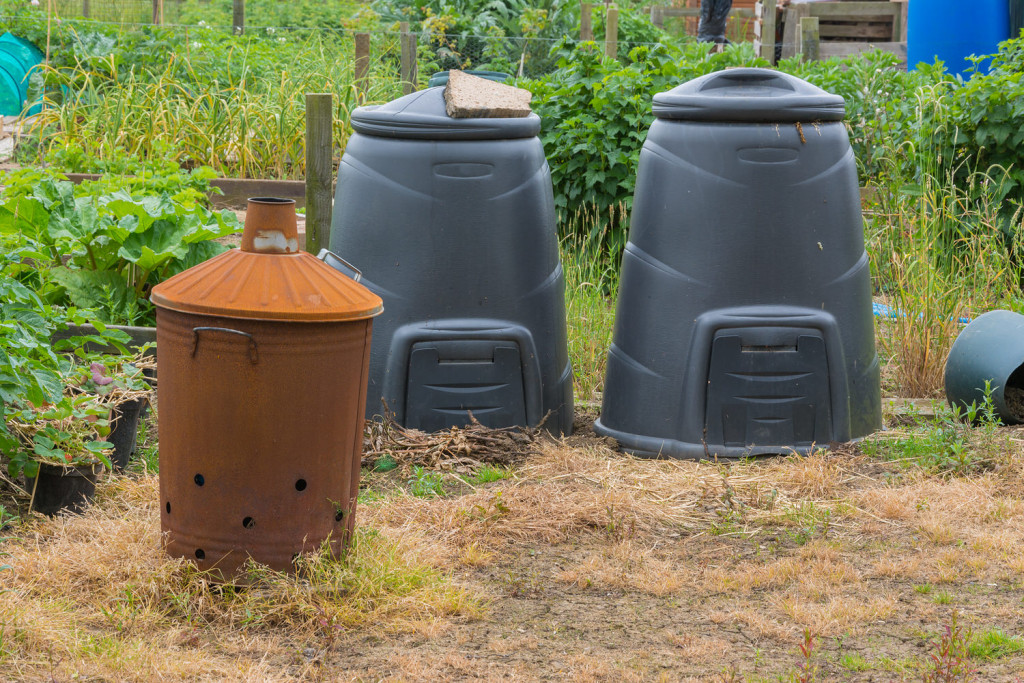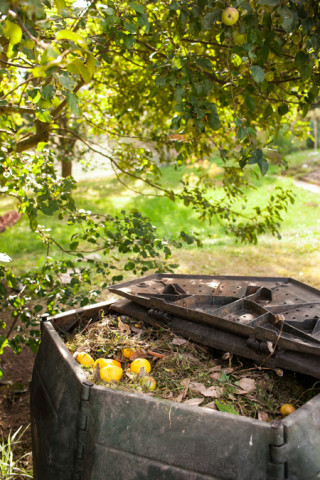Many amateur gardeners do not dispose of their garden waste in the household garbage, but use their own composter to compost the waste. The resulting compost provides important nutrients for the plants in your garden.
In addition, the decomposed organic material, called humus, provides a better structure to your soil. It increases the storage capacity for water and nutrients, especially in sandy soils. Loamy soils, on the other hand, become more permeable to air through the regular addition of compost, making them easier to work.
As you can see, it pays to use a composter to produce humus yourself and free of charge. More and more gardeners swear by the plastic composter for this purpose. It has many advantages, but also some catches. We enlighten you!

Many amateur gardeners do not dispose of their garden waste in the household garbage, but use their own composter to compost the waste. The resulting compost provides important nutrients for the plants in your garden. In addition, the decomposed organic material, called humus, provides a better structure to your soil.
It increases the storage capacity for water and nutrients, especially in sandy soils. Loamy soils, on the other hand, become more permeable to air through the regular addition of compost, making them easier to work. As you can see, it pays to use a composter to produce humus yourself and free of charge. More and more gardeners swear by the plastic composter for this purpose. It has many advantages, but also some catches. We enlighten you!
Contents
Composting In Style
If you decide to start composting in your own garden, you will relieve the burden on your residual waste garbage can and thus also protect the environment. In fact, your efforts will be doubly rewarded: you’ll save on the cost of fertilizer from the store and pay lower garbage fees for the black garbage can. Of course, a compost heap is not exactly a pretty sight and is usually considered a nuisance, especially in small gardens. A modern plastic composter is a suitable alternative in these cases.
You can close such a container with a lid. At the same time, the plastic garden composter has ventilation slots and a bottom grid. Offers for plastic composters are a dime a dozen. As a rule, they differ in capacity, flaps for removing humus and other useful extras. Before you buy such a composter, it is advantageous to know in more detail about its operation and handling.

The Plastic Composter And Its Advantages
Plastic composters, also known as plastic compost bins or tumblers, have gained popularity as a convenient way to compost organic waste in many home gardens. They come with their own set of advantages and disadvantages:
Advantages of Plastic Composters:
- Convenience and Speed:
- Plastic composters are designed for easy and efficient composting. Their tumbling or rotating design makes it simple to turn and aerate the compost, which can speed up the decomposition process.
- Rodent and Pest Resistance:
- Many plastic composters are designed with secure lids and locks, which help deter rodents and pests from accessing the composting materials. This can be particularly useful in urban or suburban settings.
- Compact Design:
- Plastic composters are available in various sizes, including compact options, making them suitable for small spaces like balconies and patios. Their contained design helps maintain a neat appearance and prevents compost from spilling.
- Temperature Regulation:
- Plastic composters often have insulating properties that help regulate internal temperatures. This can be advantageous in both cold and hot climates, as it aids in maintaining optimal composting conditions.
- Odor Control:
- Properly sealed plastic composters help contain odors more effectively compared to open compost piles. This is especially important if you live in an area with strict odor regulations.
- Moisture Retention:
- Plastic composters can help retain moisture better than open piles, which can be beneficial for the composting process. They often have tight-fitting lids that reduce water loss due to evaporation.
In conclusion, plastic composters offer several benefits in terms of convenience, odor control, and pest resistance. However, they also come with some disadvantages, including initial cost, limited capacity, and potential durability issues. When choosing a composter, consider your specific needs, available space, and local climate conditions to determine if a plastic composter is the right option for you.
The plastic composter needs a suitable location so that all processes in the compost container can take place properly. The best place is a sunny, unpaved place, which, if possible, should not be directly visible. The material inside must not dry out and the microorganisms must be able to enter through the openings at the bottom. The plastic composter is also called a thermal composter because it retains heat so well. For this reason, it is also usually available in black or other dark color.
This creates a high temperature inside. It is important to layer the waste correctly. Then, on average, it takes only eight weeks for the waste to fully decompose without the need for compost accelerators such as lime. In conventional versions made of wood or metal, the waste takes up to three years to rot into usable compost.
It’s no wonder that the plastic composter is also called a “fast composter.” But the plastic composters not only have the advantage that all the contents such as leaves, dried plants and other green waste decompose faster. The closed container also proves very helpful in other places:
- The odor created by open wooden composters is often considered inappropriate and annoying. With a plastic composter, this odor remains in the bin.
- No mice, rats or birds are attracted.
- The plastic composter takes up very little space, making it suitable for amateur gardeners looking for a space-saving solution.
- The actual container made of plastic does not rot compared to wood, so it can be used for many years.
However, when buying, don’t just look for a low price. Depending on how big your garden is, you will need a large capacity so that the thermal composter is sufficient for your garden waste. Also, place a lot of emphasis on high quality. It is best to find out in advance about the different models and also compare the reviews.
The Plastic Composter And Its Disadvantages
Disadvantages of Plastic Composters:
- Cost:
- Plastic composters can be more expensive than traditional open compost piles or homemade compost bins. The initial investment may be a barrier for some gardeners.
- Durability:
- Some plastic composters may not be as durable as other materials like wood or metal. Over time, exposure to UV rays and the elements can cause plastic to become brittle or break.
- Limited Capacity:
- Plastic composters often have a limited capacity compared to open bins or piles. If you generate a significant amount of organic waste, you may find them insufficient.
- Aeration:
- While the tumbling design can be advantageous, some plastic composters may not provide as much aeration as needed for effective composting. You may need to manually turn the composter more frequently.
- Plastic Waste:
- Using a plastic composter contributes to the use of plastic materials. Some people prefer composting methods that involve less plastic to reduce environmental impact.
- Heat Retention in Hot Climates:
- In extremely hot climates, the insulating properties of plastic composters can lead to excessively high internal temperatures, which may harm beneficial microorganisms and slow down the composting process.
Probably the biggest disadvantage of this composter variant is that you usually have to budget quite a lot of money, depending on the capacity. Small ones are cheaper, but they also risk toppling over more easily in windy conditions. Simple models without a multi-chamber system also have the disadvantage that the humus can only be removed once the contents of the container have undergone complete composting. When using it, always make sure to close the lid correctly. Otherwise, the compost material may begin to rot. You can try to avoid this problem by opting for a drum composter. It stands on steel legs and is operated by a crank to turn it. Simply add food scraps, such as potato peels, to the plastic housing and then turn the crank once or twice to mix the material well.
Conclusion: Make Free Fertilizer For Your Garden Quickly
The plastic composter is definitely recommended for you if your garden is rather small or you find a normal compost pile annoying. Due to the heat inside, the composting process is extremely accelerated, so you can benefit from usable compost faster. So if you only need a manageable amount of fertilizer for your plants in a rather small garden, you certainly won’t make a wrong choice with a plastic quick composter.

